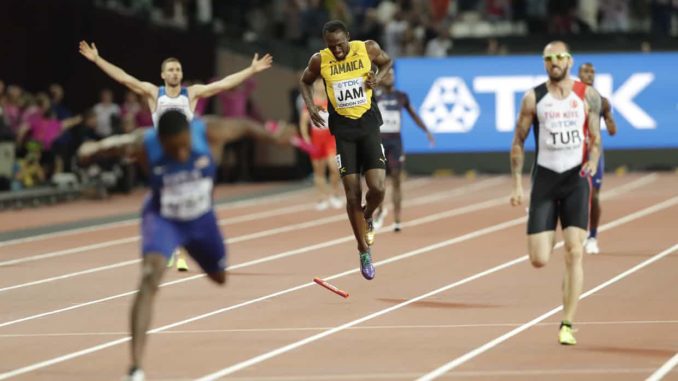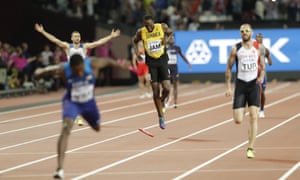
The cheers have surely not been louder all world championships. But, dramatically and unexpectedly, this time they were not for Usain Bolt, who ended the final race of his career face down on the track and with his hamstring blown. Instead they rang loud and true for the young British athlete Nethaneel Mitchell-Blake, who held off the American Christian Coleman to take the home nation’s second gold medal of the championships in a dramatic men’s 4x100m relay final.
It was a sensational performance that was reflected on the clock. The British team’s time was 37.47 – a national record and the fastest time in the world this year. The United States were second in 37.52, with Japan third in 38.04. Britain has not had the greatest of world championships but suddenly the crowd were off their feet, jumping and hugging and applauding.
But, inevitably, there was sorrow for Bolt too. The Jamaican team were in third place when the greatest sprinter and showman the sport has ever known took the baton. He is older, slower, and greyer now – but he is still a man who can turn the ignition key to his own legs quicker than any other sprinter on the planet.
This has been a world championships where many of the sport’s biggest stars have been knocked off their perch. Bolt. Mo Farah. Kendra Harrison. Wayde van Niekerk. All have felt the jolting sting of a rare defeat. Yet no one expected this. The Jamaican men’s 4x100m relay team knew they were one of sport’s great bankers, having not lost a global relay on the track since Osaka in 2007. Not this time.
Afterwards CJ Ujah, who made a sensational start and put Britain ahead out of the blocks said: “I just wanted to run a good race and a night like this is fantastic.”
Adam Gemili, who proved his fitness beyond doubt after being controversially left out of the 200m, called it “the best feeling in the world”.
Meanwhile Danny Talbot admitted a hidden truth: “This is what we wanted to do. Everyone knew we wanted to win a medal – but deep down we wanted gold.”
Bolt, meanwhile, hobbled to the line, helped by his team-mates. This is not how he would have wanted it to end. It is over 15 years since athletics insiders started speaking in hushed awe about a young lank Jamaican who had won the 2002 world junior championships in 20.61sec. That time alone, set as a 15-year-old, would have beaten two of athletes in Thursday’s 200m final.

In truth it wasn’t smoothest set of baton changes ever seen by a British team. Henry was at full stretch when she handed over to Henry, while Asher-Smith had to check her stride to get the baton on the third leg. But with the Americans’ handovers also ragged, particularly their final exchange to Tori Bowie, the world 100m champion, it meant that Neita was in the hunt for gold with 80 metres to go.
There was a shock in the women’s 100m hurdles as the Australian Sally Pearson, who came close to quitting after serious injuries, blasted clear of world record holder Kendra Harrison to win gold.
Pearson has fond memories of this track, having won Olympic gold at London 2012. But two years ago in Rome she suffered a wrist injury so serious she feared she would need her lower arm amputated. To make matters worse, she also missed the Olympics with a hamstring injury.
Yet she was back close to her best here, leading from the gun to win in 12.59sec. It was her second world title – six years after her first in Daegu in 2011. No wonder she shouted: “Oh my God!” repeatedly after she crossed the line. She was barely any more coherent afterwards, “That was bloody hard,‚“ said Pearson. “It’s been a long journey back from injury, but to get this moment and go and celebrate in front of my family is unreal.
“My husband is in the crowd there somewhere, I’ll try and find him and give him a hug soon. This is just so incredible to be a world champion again.”
The American Dawn Harper-Nielsen took silver in 12.63, while the Germany Pamela Dutkiewicz grabbed a surprise bronze 0.09sec further back. Incredibly, Harrison – who set the world record of 12.22sec on this track last year – could only run 12.74, a time she could normally do in her sleep.


Be the first to comment